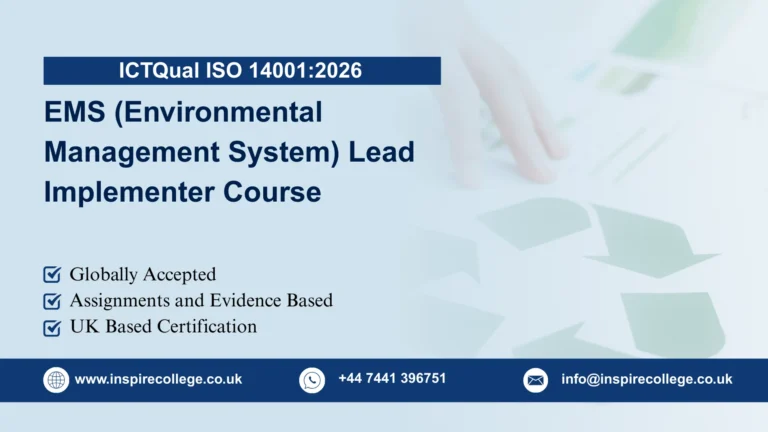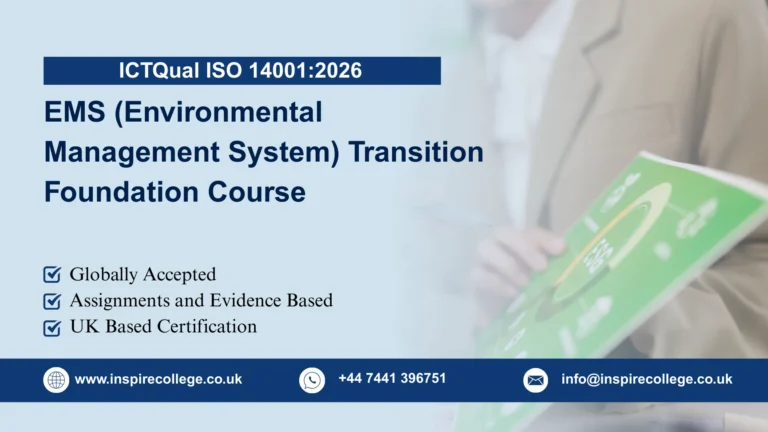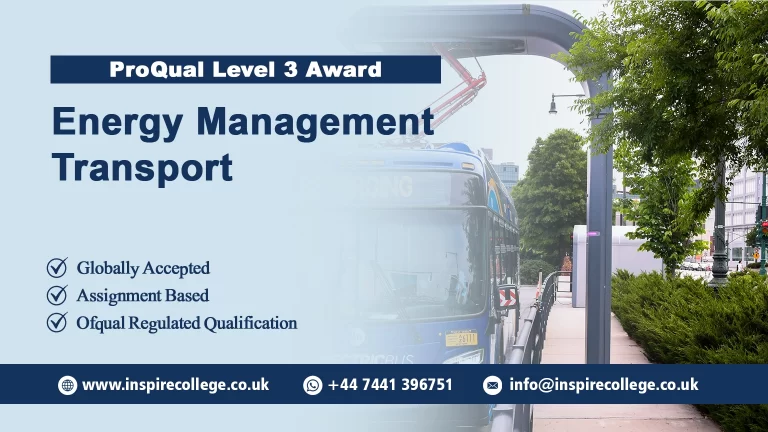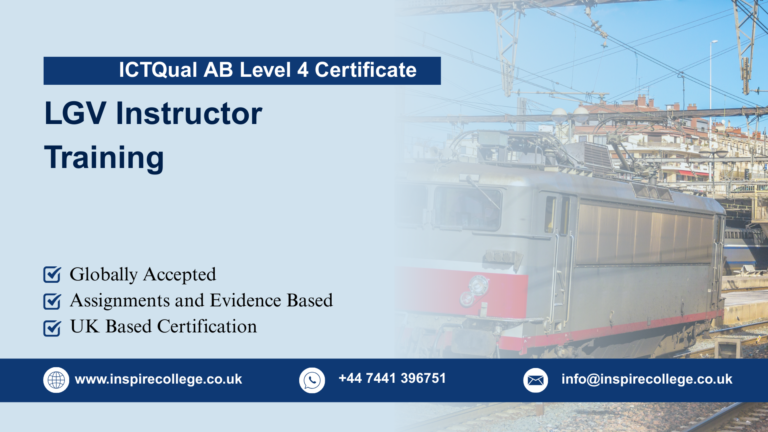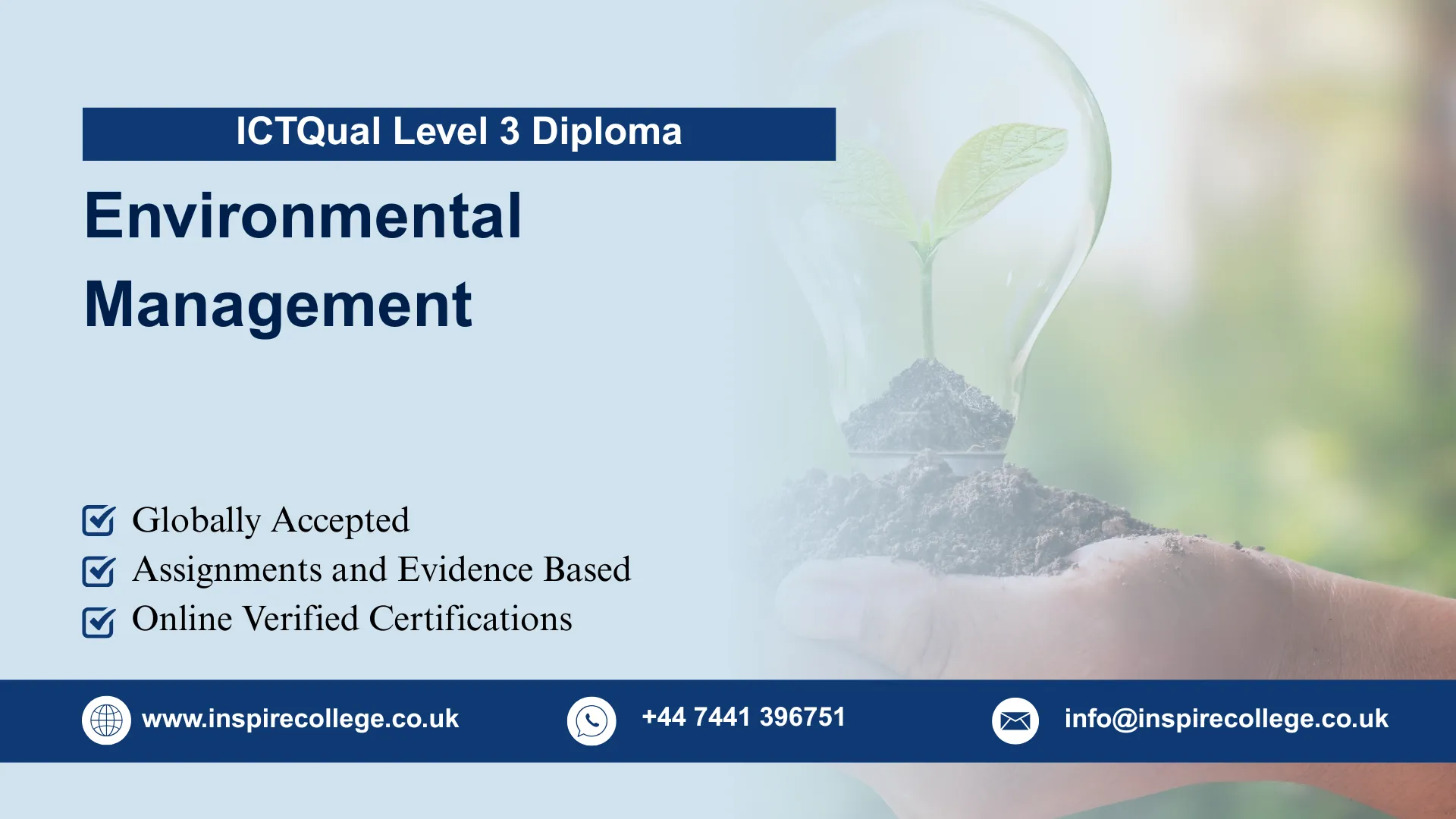
ICTQual Level 3 Diploma In Environmental Management
In today’s rapidly evolving world, effective environmental management is essential for sustainable development and the preservation of natural resources. The ICTQual Level 3 Diploma in Environmental Management equips learners with the critical knowledge and practical skills required to address environmental challenges, implement sustainable practices, and promote ecological responsibility across diverse industries.
ICTQual Level 3 Diploma In Environmental Management is designed to provide learners with a deep understanding of environmental policies, resource management, and sustainability strategies. Through a structured curriculum, participants will explore key topics such as environmental impact assessment, waste and pollution management, renewable energy solutions, and regulatory compliance. The program emphasizes both theoretical foundations and practical applications, ensuring that learners can apply their skills in real-world scenarios.
By completing ICTQual Level 3 Diploma In Environmental Management, learners will gain expertise in developing and implementing effective environmental management systems, conducting risk assessments, and supporting organizational sustainability initiatives. ICTQual Level 3 Diploma In Environmental Management fosters critical thinking, problem-solving, and strategic planning abilities, preparing professionals to contribute meaningfully to environmental stewardship and corporate responsibility.
Ideal for aspiring environmental managers, sustainability officers, and professionals seeking to enhance their career prospects, this qualification opens pathways to higher education, including bachelor’s and master’s degrees in environmental science, sustainability management, and related fields, as well as specialized certifications in areas such as ISO 14001 systems and renewable energy.
The entry requirements for this diploma may vary depending on the institution offering the program, but typically include the following:
- Minimum Age
- Candidates must be at least 18 years old, ensuring readiness for independent learning and professional development.
- Educational Background
- Applicants should have completed secondary education, such as a high school diploma or an equivalent qualification recognized by the awarding body.
- Literacy and Numeracy Skills
- Learners must possess basic literacy and numeracy skills to effectively engage with course materials, interpret environmental data, and complete written assignments and assessments.
- English Language Proficiency
- As the course is delivered in English, participants should have sufficient proficiency to read and comprehend course materials, actively participate in discussions, and complete written work.
- Readiness for Learning
- Candidates should demonstrate motivation and commitment to learning, as the course requires active engagement with sustainability concepts, environmental management practices, and practical applications.
Meeting these entry requirements ensures that learners are fully prepared to benefit from the course, gain essential skills in environmental management, and progress toward higher education or professional career opportunities in the environmental and sustainability sector.
Mandatory Units
This qualification, the ICTQual Level 3 Diploma In Environmental Management, consists of 11 mandatory units.
- Introduction to Environmental Management
- Environmental Policy and Legislation
- Sustainable Development
- Waste Management
- Renewable Energy
- Conservation and Biodiversity
- Environmental Impact Assessment (EIA)
- Environmental Risk Management
- Water Resource Management
- Climate Change and Its Impacts
- Environmental Economics
Introduction to Environmental Management
- Understand fundamental concepts of environmental science and management.
- Identify and describe key global environmental issues.
- Explain the evolution and development of environmental management practices.
2. Environmental Policy and Legislation
- Comprehend the structure and purpose of international and national environmental laws and policies.
- Conduct and understand the procedures for environmental impact assessments (EIA).
- Apply knowledge to ensure compliance with environmental regulations.
3. Sustainable Development
- Grasp the core principles of sustainable development.
- Implement sustainability practices in business and environmental contexts.
- Evaluate the effectiveness of sustainable development initiatives, including SDGs.
4. Waste Management
- Understand strategies for waste reduction, recycling, and disposal.
- Apply waste management practices to minimize environmental impact.
- Identify, handle, and manage hazardous waste in accordance with regulations.
5. Renewable Energy
- Identify and describe various renewable energy sources.
- Evaluate the benefits and challenges of renewable energy technologies.
- Promote and implement the use of renewable energy to reduce carbon emissions.
6. Conservation and Biodiversity
- Understand the importance of biodiversity and ecosystem health.
- Identify and implement effective conservation strategies.
- Manage protected areas and wildlife sustainably.
7. Environmental Impact Assessment (EIA)
- Conduct environmental impact assessments using established methodologies.
- Analyze and interpret EIA results to support decision-making.
- Develop and implement strategies to mitigate adverse environmental impacts.
8. Environmental Risk Management
- Identify and assess environmental risks.
- Develop comprehensive risk management plans.
- Apply strategies to mitigate and manage environmental risks effectively.
9. Water Resource Management
- Understand principles of sustainable water resource management.
- Implement water conservation and efficiency techniques.
- Develop strategies to manage water quality and reduce pollution.
10. Climate Change and Its Impacts
- Understand the science of climate change and its global effects.
- Develop strategies to mitigate climate change impacts.
- Formulate adaptation measures to cope with climate-related challenges.
11. Environmental Economics
- Grasp economic principles relevant to environmental management.
- Conduct cost-benefit analyses and environmental valuations.
- Apply economic instruments and market-based tools to address environmental issues.
Higher-Level Diplomas and Certificates
- ICTQual Level 4 Diploma in Environmental Management: Expand on foundational knowledge with advanced studies in environmental management practices.
- Specialized Certifications: Pursue focused training in areas such as environmental auditing, sustainable development, renewable energy technologies, and environmental impact assessment (EIA).
Undergraduate Degrees
- Bachelor’s Degree in Environmental Science: Gain an in-depth understanding of environmental systems, issues, and management strategies.
- Bachelor’s Degree in Environmental Engineering: Learn to design and implement engineering solutions to environmental challenges.
- Bachelor’s Degree in Sustainability Studies: Study sustainability principles, policies, and practices for diverse sectors.
Professional Development Courses
- Short Courses and Workshops: Enhance practical skills in GIS, EIA techniques, environmental policy analysis, and sustainability reporting.
2. Career Opportunities
Environmental Consultancy
- Junior Environmental Consultant: Assist organizations in developing and implementing environmental strategies.
- Environmental Impact Assessor: Conduct and analyze EIAs for projects across sectors.
Government and Regulatory Bodies
- Environmental Officer: Ensure compliance with environmental laws and policies.
- Sustainability Coordinator: Develop and manage sustainability initiatives within governmental organizations.
Non-Governmental Organizations (NGOs) and Non-Profits
- Conservation Officer: Protect biodiversity and natural habitats.
- Project Manager: Lead environmental projects and sustainability campaigns.
Corporate Sector
- Environmental Health & Safety (EHS) Specialist: Implement environmental and safety programs within organizations.
- Corporate Social Responsibility (CSR) Manager: Drive corporate sustainability and align initiatives with environmental goals.
Renewable Energy Sector
- Renewable Energy Technician: Install and maintain renewable energy systems.
- Energy Efficiency Advisor: Advise organizations on reducing energy consumption and carbon footprints.
Waste Management Industry
- Waste Management Coordinator: Develop programs for waste reduction and recycling.
- Hazardous Waste Manager: Oversee safe disposal and treatment of hazardous materials.
3. Professional Recognition and Memberships
Professional Bodies and Organizations
- Institute of Environmental Management and Assessment (IEMA): Access networking, professional development, and industry insights.
- Chartered Institution of Water and Environmental Management (CIWEM): Gain recognition in water and environmental management fields.
Certification Programs
- Certified Environmental Professional (CEP): Validate expertise and enhance professional credibility.
- LEED Accreditation: Work on green building projects and sustainable construction initiatives.
4. Entrepreneurial Opportunities
Environmental Consultancy Firm
- Start a consultancy offering EIAs, sustainability planning, and waste management solutions.
Green Business Initiatives
- Launch eco-friendly products or renewable energy solutions that promote sustainability and environmental conservation.
The ICTQual Level 3 Diploma in Environmental Management is designed for learners who are passionate about sustainability, environmental protection, and responsible resource management. This course is ideal for:
- Aspiring Environmental Professionals
- These are individuals who are motivated to begin a career in environmental management, sustainability, conservation, or renewable energy sectors. They are eager to gain practical knowledge and skills that will allow them to contribute meaningfully to environmental projects, support organizations in implementing sustainable practices, and pursue specialized roles such as environmental consultant, impact assessor, or sustainability coordinator.
- Current Professionals
- Employees already working in environmental roles, corporate social responsibility (CSR), health and safety (EHS), or sustainability sectors can greatly benefit from this course. It enables them to enhance their professional knowledge, acquire practical tools for environmental management, stay updated with current policies and legislation, and improve their ability to implement sustainability initiatives effectively within their organizations.
- Recent School or College Graduates
- Learners who have completed secondary education, high school, or an equivalent qualification and are seeking to progress into higher education or professional training in environmental science, sustainability, or related fields. This course provides a strong foundation in environmental concepts, practical applications, and career-focused skills to prepare them for advanced diplomas, undergraduate degrees, or entry-level positions in the green economy.
- Entrepreneurial Minds
- Individuals with an interest in launching eco-friendly businesses, green initiatives, or environmental consultancy services. This course equips them with the knowledge of sustainable practices, renewable energy solutions, waste management strategies, and environmental compliance, allowing them to create innovative products, services, or businesses that address environmental challenges and meet sustainability goals.
- Lifelong Learners and Change Makers
- Learners who are committed to making a positive impact on the environment and society. They are motivated to develop in-depth expertise in environmental policies, sustainability practices, waste management, renewable energy, and biodiversity conservation. This course enables them to apply their skills to community projects, professional roles, or advocacy, contributing to long-term environmental improvements and sustainable development initiatives.
- Professionals Preparing for Further Education:
- Learners planning to progress to higher-level qualifications, including Level 4 Diplomas, undergraduate degrees, or specialized certifications in environmental management.
Key Characteristics of the Ideal Learner:
- Strong interest in sustainability, climate change, and environmental issues.
- Basic literacy and numeracy skills to engage with course materials and assessments.
- Proficiency in English for effective communication, comprehension, and report writing.
- Motivation to apply knowledge practically in workplace, community, or research settings.
- Commitment to continuous learning and professional development in environmental management.
This course is perfect for learners seeking a solid foundation in environmental management, practical skills, and career-focused knowledge to thrive in a rapidly growing green economy.
Register Now
FAQs for ICTQual Level 3 Diploma In Environmental Management

